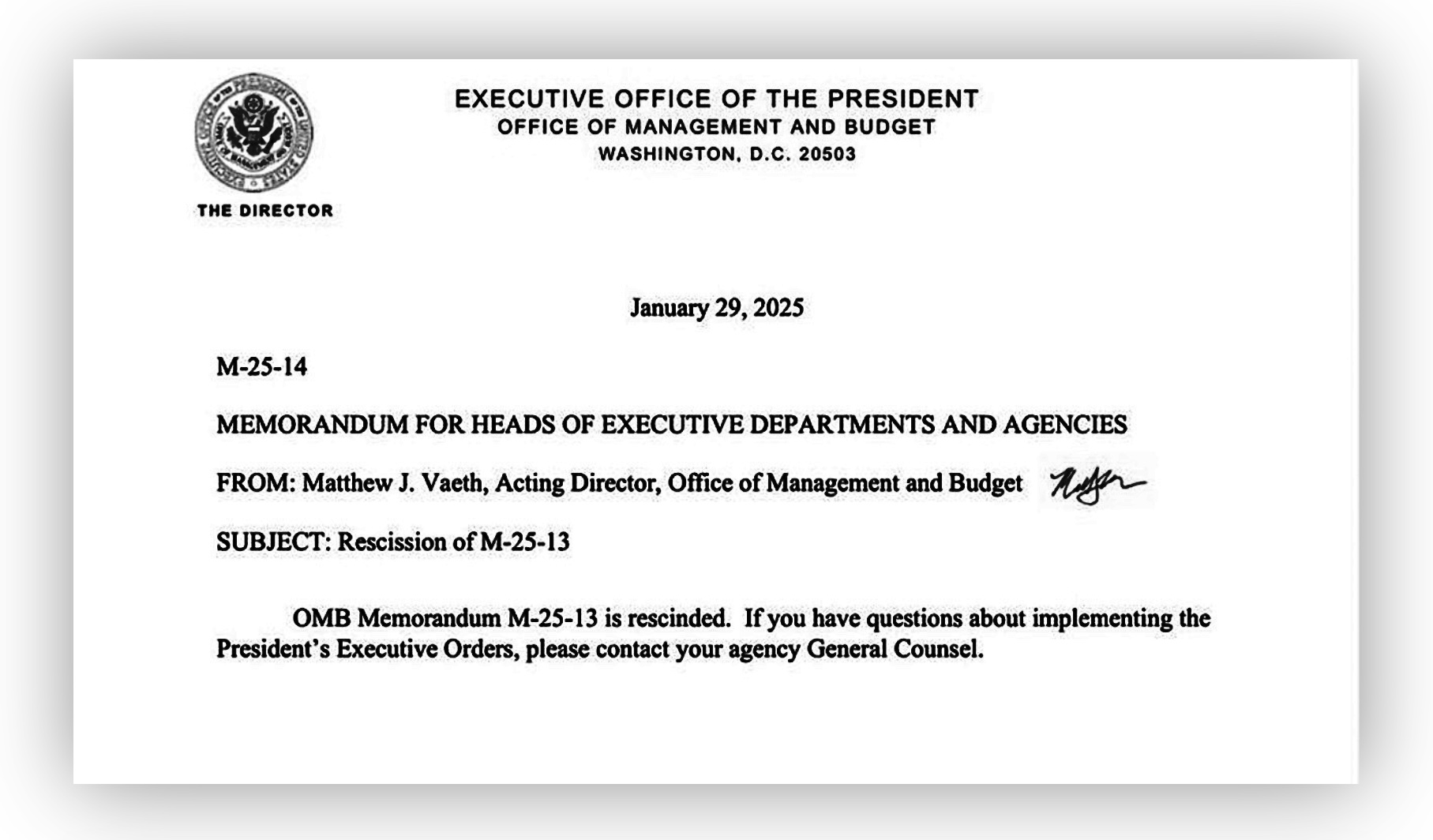
- Details
- By Native News Online Staff
The White House Office of Management and Budget on Wednesday rescinded its controversial memo that had temporarily frozen federal funding, ending two days of uncertainty for tribal nations that had raised serious concerns about disruptions to treaty-mandated services.
Acting OMB Director Matthew J. Vaeth notified federal agencies of the reversal in a two-sentence memo, telling them the order was rescinded and to consult their general counsel about implementing the president’s executive orders.
U.S. District Judge Loren L. Alikhan had temporarily blocked the freeze through February 3 following emergency legal action by nonprofit organizations. A separate lawsuit by Democratic state attorneys general was also pending when OMB withdrew the order, and the Native American Rights Fund (NARF) said it was investigating potential legal action to protect tribal rights and citizens.
The reversal came just two days after Vaeth’s original memo launched widespread confusion among agency officials, Congress, states, nonprofits and tribes. The concerns were especially acute in Indian Country, where federal funding supports essential services including healthcare, education, housing, and economic development programs.
Tribal leaders had mounted swift opposition to the freeze. The Coalition of Large Tribes, representing 21 tribes including the Navajo Nation and Muscogee (Creek) Nation, passed an emergency resolution today calling for tribal exemptions based on treaty rights and federal trust responsibilities.
"The federal government has a solemn obligation to honor its trust responsibility and financial commitments," Southern Ute Chairman Melvin J. Baker said in a statement Wednesday. "We recognize the critical importance of the programs and services that rely on these funds, and we are committed to working proactively to ensure their continued operation for the benefit of the Tribal Membership."
During the brief freeze, some tribes had rushed to access already-approved federal funding, with multiple nations successfully securing substantial drawdowns before the original Tuesday deadline, according to sources across Indian Country.
White House Press Secretary Karoline Leavitt declared that rescinding the OMB's memo did not mean an end to the Trump administration's efforts. "This is NOT a rescission of the federal funding freeze. It is simply a rescission of the OMB memo," Leavitt wrote on X wrote on X (formerly Twitter). "The President's EO's on federal funding remain in full force and effect, and will be rigorously implemented."
Democratic leaders acknowledged the threat to funding isn't over. “This is an important victory for the American people whose voices were heard after massive pressure from every corner of this country—real people made a difference by speaking out,” Sen. Patty Murray (D-Wash.), vice chair of the Senate Appropriations Committee, said in a statement. “Still, the Trump administration—through a combination of sheer incompetence, cruel intentions, and a willful disregard of the law—caused real harm and chaos for millions over the span of the last 48 hours which is still ongoing. The fight is far from over.”
More Stories Like This
Native News Weekly (August 25, 2024): D.C. BriefsScope Narrowed, Report Withheld: Questions Mount Over Michigan Boarding School Study
Zuni Youth Enrichment Project Announces Family Engagement Night and Spring Break Youth Programming
Next on Native Bidaské: Leonard Peltier Reflects on His First Year After Prison
Deb Haaland Rolls Out Affordability Agenda in Albuquerque
Help us defend tribal sovereignty.
At Native News Online, our mission is rooted in telling the stories that strengthen sovereignty and uplift Indigenous voices — not just at year’s end, but every single day.
Because of your generosity last year, we were able to keep our reporters on the ground in tribal communities, at national gatherings and in the halls of Congress — covering the issues that matter most to Indian Country: sovereignty, culture, education, health and economic opportunity.
That support sustained us through a tough year in 2025. Now, as we look to the year ahead, we need your help right now to ensure warrior journalism remains strong — reporting that defends tribal sovereignty, amplifies Native truth, and holds power accountable.
 The stakes couldn't be higher. Your support keeps Native voices heard, Native stories told and Native sovereignty defended.
The stakes couldn't be higher. Your support keeps Native voices heard, Native stories told and Native sovereignty defended.
Stand with Warrior Journalism today.
Levi Rickert (Potawatomi), Editor & Publisher

